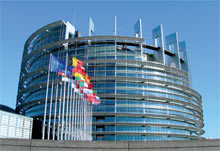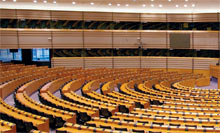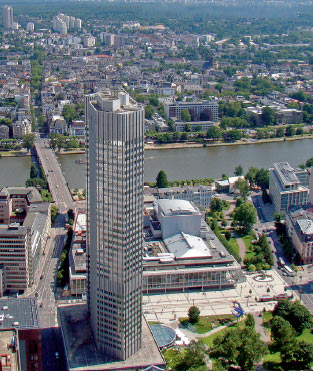Does the European Union have anything to do with you?FINANCIAL
Gregorio Robles. Professor in Philosophy of Law in the University of the Balearic Islands. Member of the Royal Academy of Moral and Political Sciences
Surely you have wondered, as I had as well, does the European Union really have anything to do with me?
The 7 June 2009 elections to the European Parliament have shown, once again, the indifference that society overall has towards Europe. This apathy when it comes to choosing European Parliamentary Members is not new or exclusive to the Spaniards. This is fairly obvious because in previous elections high percentages of abstention were also recorded and the fact that it is not exclusively ours is revealed by the unarguable fact of the low voting turnout in all the member states.
What are the causes of this lack of interest? How can this indifference be justified? I think that the first cause has to be sought in the image that our society overall has of the European Community. An image that we can define with two words: distant and bureaucratic, but above all with the first.
Distance has two very different aspects but they are combined in the psychological perception of all of us. In the first instance I refer to geographic distance; and in the second instance to the poor knowledge that we have of the European institutions and how they function. One has to admit that Europe’s institutional reality is anything but simple. People cannot properly locate on the map the headquarters of the various bodies. Take this test yourself and with your closest friends, just question everybody where the headquarters of the Community Tribunal are located, those of the Commission, those of the European Parliament and those of the Central European Bank. You will probably obtain confused replies, something like “over there, near the centre of the continent”, and there will be an uncertain array of the names of fairly notable cities in which with little conviction and many doubts the following will appear: The Hague, Brussels, Paris, Amsterdam, Maastricht, Luxembourg, Stratsbourg, Nice, Saarbrücken, Cologne and other possible candidates. If this happens to you, wandering confusedly in this regard, do not worry, you form part of most of humanity that also has a hazy outlook.
Ask the Europeans where the headquarters of the Community Tribunal, The Commission, and The European Central Bank are located
But the little knowledge of the institutions and their functioning is much worse than these mistakes in community geography; and the knowledge of the effect of community legislation within the member states and consequently also within Spain is even less. The average citizen cannot be blamed for this ignorance and it would be vain to require him or her to master the European labyrinth. To achieve this objective one needs something like a masters degree. In the first place the political class that we have is to blame, politicians who are almost exclusively concerned with gathering votes and do absolutely nothing where the necessary education is concerned. We deserve politicians who teach the people what they need to know. Current political discourse is excessively rhetorical (aimed at convincing) as well as excessively demagogical, in other words exaggerated criticism of the adversary and over sizing of self-satisfaction. Let us remember the European election campaigns that we have lived through. They have all been characterised by having been done in national key, totally forgetting typically European issues. In this way how is it possible to interest large masses of the population in issues that are not even named in the campaigns?
However the causes that produce this image of distance do not stop there. To mention one more and it is not a small one, I will refer to something that I have just mentioned: the European labyrinth. I normally say to my law students at the University on the first day of lectures: “what you are going to study is like an enormous labyrinth, which apart from being very extensive and very innately intricate is constantly changing over time, becoming even more of a labyrinth”. I do not say this to discourage the students so much as to warn them. From its beginnings the putting into practice of the European project has been complex in its composition, surprising in many of its functional aspects and above all strangely confusing from the terminological viewpoint.
Did you know, for example, that there were three European Communities and now there are two because the first of all (the CECA - European Coal and Steel Community) ceased to exist in 2002 because one article of its founding treaty provided for 50 years of existence? Did you know that despite the three European Communities existing during these 50 years the whole world referred to the combination of them with the name of European Community? Does it not seem strange to you that the old denomination of the European Economic Community has disappeared and has been replaced by that of “European Community” which is precisely the name that as I said served previously and still does today to denominate the three in conjunction or the two that remain after the first one’s extinction. Did anybody tell you that the Maastricht Treaty, which is the one that created the European Union has the peculiarity of the articles not being accompanied by their corresponding Arabic number, as is normal in any body of norms, but by the letters of the alphabet (article A, article B and so on successively until article S)? But then the Amsterdam Treaty changed it putting numbers when all of us involved in European law had patiently learnt the Treaty with its respective letters?
And if we talk of the frustrated European Constitution I would ask you: do you know anybody who at any time has read the entire text? My reply, if we exclude the people who were obliged to read it because of their profession, I do not know anybody who has read it, although over a certain period I continuously ask many of my friends and acquaintances. Most of all I obtained replies like this one, “well I have skimmed through it and stopped on the bit that interested me”.
On the basis of the circumstances I have described and others that have not been mentioned it has been said in conclusion that the European Union has a “democratic deficit”, that the European Parliament does not serve for much and that the Union’s government (this combination of the Council and the Commission) is subject to national interests. And however...
However the people must know that a significantly high percentage of national legislation (in our case Spanish legislation) is directly or indirectly determined by the Community norms. This means that the Treaties and the law produced by the Community institutions overall make up an inherited body of legislation of considerable size whose efficacy extends to the interior of the member states. Although you may not be aware of it your real life is governed in an astounding proportion by the EU rules. This happens through the simple reason that community law is integrated into the Spanish judicial order (the same way as it is integrated into the judicial orders of the rest of the member states).
The political class that we have concerns itself almost exclusively with gathering votes and does not provide the necessary education
Integration consists of community norms, which in addition to being EU law become part of Spain’s internal law; they are Spanish law. Therefore they are norms that are applied by the national authorities, meaning by the public administrations and likewise by our courts and judges. This means that said norms can also be invoked by the individuals and companies in dealings with said administrative and judicial authorities.
What happens is that the mechanisms that make this integration of the community norms in the internal law of the member states are subtle and diverse and therefore the average citizen does not easily perceive them. The citizen is almost never aware that a law that the Spanish Parliament promulgated last week and that affected them is a consequence for example of a community directive that obliged the State to change its legislation. People perceive that it is the national parliament that continues to legislate as it has always done; and they do not see behind parliament’s actions an EU mandate, when in reality the mandate very frequently exists. The production of Spanish law has become more complex because it requires prior studies and scenarios before the national parliament can act. But there is scarcely any social perception of this complexity. The same discrediting of the European Parliament (and consequently of elections to the parliament) has a similar cause, because its role in the production of Community norms is unknown. It is true that it does not have the same function as the national parliaments but it has been collaborating for many years now with the Commission and Council in an effective way in the common task of producing law that afterwards will be integrated in the State judicial orders. When have you heard our politicians explain to the people that this collaboration consists of and what the procedures are that sustain it?
Do you know anybody who at any time has read the entire text of the frustrated European Constitution?
I have allowed myself to underline only certain basic aspects of the EU’s influence in our own lives but I have left unsaid many other aspects, for example the rights that attach to us as “European citizens”. This concept was introduced by the Treaty of Maastricht that creates, together with national citizenship another citizen status from which rights are derived, as important as that of being able to obtain assistance from the embassy of any member state in a third country when Spain does not have diplomatic representation in it and do it in the same conditions as the citizens of the member state in question.
Therefore if anybody asks you “does the EU have anything to do with me?” you ought to know that the reply really should be this one “yes, it has a lot to do with me although I find very hard to believe it”.






